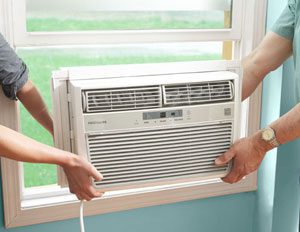 Summer is a time for cookouts, pool parties and evenings outside spent with friends and family. Unfortunately, summer is also a time where many homeowners who still use window units fear opening their electric bills. Having central air can help make opening those bills a lot less stressful. There are several advantages to having a central air conditioning system, and saving money is only one. Read on to learn more.
Summer is a time for cookouts, pool parties and evenings outside spent with friends and family. Unfortunately, summer is also a time where many homeowners who still use window units fear opening their electric bills. Having central air can help make opening those bills a lot less stressful. There are several advantages to having a central air conditioning system, and saving money is only one. Read on to learn more.
Room Air Conditioning
A room air conditioner, which is also known as a window unit, only cools a single room. They are available in different sizes depending on the size of the room you are cooling and are placed on the windowsill of that particular room. While a room or window unit may be a good choice when you only need to cool one room, using several units to cool an entire house can be quite expensive and ineffective. Below are the most common considerations for comparing a room unit and central air conditioning.
- The cost – Since a room unit runs continuously and is less efficient at cooling, it can drive up the cost of electricity used, resulting in higher bills.
- The seal – A room unit doesn’t have a tight seal around it so it let’s heat in and can even let bugs in. Not to mention, it can also make it easier for an intruder looking to gain access to your home. It is not a safe option, especially on the ground level floors of your house.
- Re-installation – Kompareit points out that room units can be cumbersome to handle. A room unit is meant to be removed after each season and re-installed the next season. Not only is that labor intensive but you have to insulate the window with weather stripping each time.
- It’s noisy and unattractive – Aside from being a physically large piece of equipment sticking out of each window, the noise output is distracting and can even be obnoxious at times.
- It’s good for small spaces – Two things need to be measured before using a room unit. First, the window itself must be sized to be sure the A/C will fit. Typically, overly large windows don’t accommodate window units. Then, the room must be measured to calculate the correct British Thermal Unit, or BTU needed to adequately cool it. The more significant BTU output equals a heftier price tag as well.
Central Air Conditioning
A single thermostat controls the whole house with central air conditioning. Most central air systems are split systems, meaning there is an outdoor unit that houses the compressor and condenser coil, and an indoor unit that is usually installed on top of the furnace, holding the indoor coil. Dave’s Cooling & Heating has been installing air conditioners since 2006 and has found the following points to be valid when considering a central air conditioning system.
- Better cooling – The central unit is a more effective system for keeping the temperature consistent throughout the entire house.
- Cleaner air – The filter system is stronger in a central air system.
- Quiet – The compressor, located outside, causes the central system to run more quietly than a window unit. You’ll no longer have to adjust the volume on the television each time the air turns on.
- Efficient – According to the Spruce, once installed, a central system is virtually labor free, meaning they don’t need to be reinstalled every season. Although we do recommend you have an annual checkup and regular filter changes. They operate more quietly and effectively and in the long run, they will save on your energy bills.
A nice alternative to central air conditioning, especially in older homes that are without current ductwork, is a ductless system such as this one from Mitsubishi. Whether you want to install a multi-zone unit or one indoor unit, Mitsubishi has the right system for you. We recommend considering all the facts and consulting a professional when looking into a central air conditioning system. We are happy to offer a free estimate to install a new system or replace an existing system. Contact our office to schedule your appointment.

























